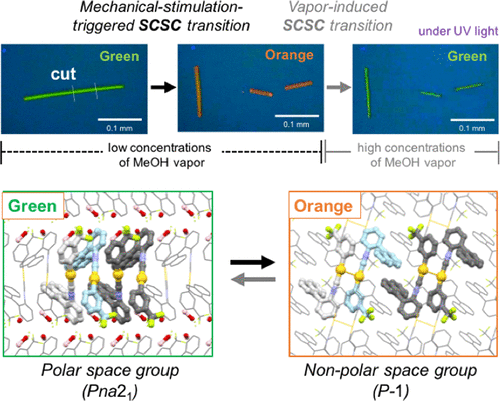Mechanical-Stimulation-Triggered and Solvent-Vapor-Induced Reverse Single-Crystal-to-Single-Crystal Phase Transitions with Alterations of the Luminescence Color

Luminescence alterations in solid-state materials upon external stimulations have attracted much attention due to their potential for the development of highly functional devices or sensors. We have previously reported the first examples of mechano-induced single-crystal-to-single-crystal (SCSC) phase transitions of gold(I) isocyanide complexes under concomitant emission-color changes. However, the reverse phase transitions of the crystals obtained after mechanical stimulation have not yet been achieved. Herein, a reversible change of the luminescence based on two SCSC phase transitions via mechanical cutting and solvent-vapor adsorption is described. Crystallization of a gold(I) complex that bears CF3 and biaryl moieties from CH2Cl2/MeOH afforded a green-emitting single crystal packed in a polar space group (Pna21). The green-emitting single crystals included MeOH molecules. Upon cutting the crystal under MeOH vapor at 22 °C, the green-emitting single crystal spontaneously changed into a centrosymmetric orange-emitting single crystal (P1̅) under concomitant release of MeOH. Remarkably, the initial green-emitting crystal could be recovered from the orange-emitting crystal by a solvent-induced SCSC transition under saturated MeOH vapor. The combination of two different types of SCSC phase transitions enables the reversible structural and photoluminescent alternations.

